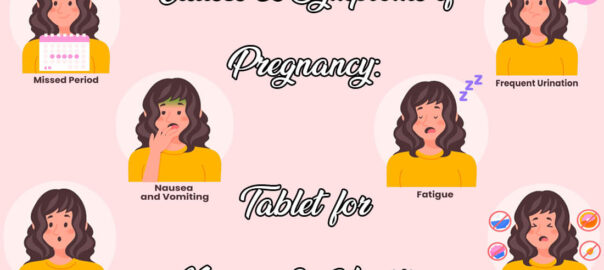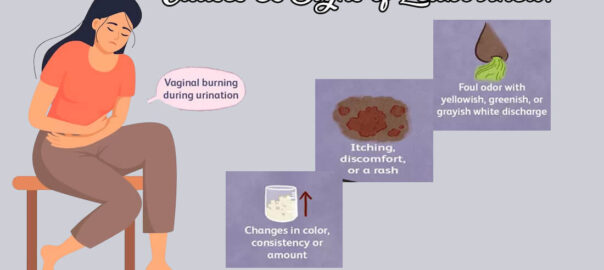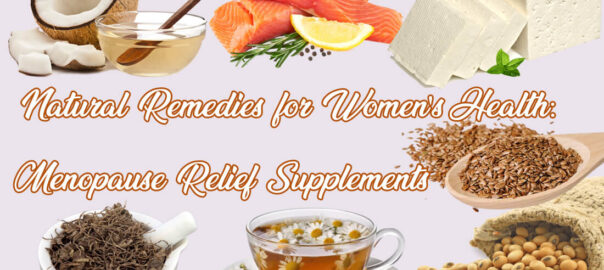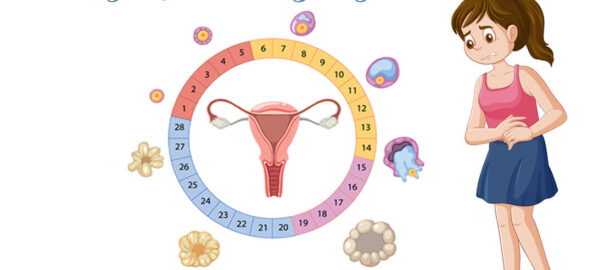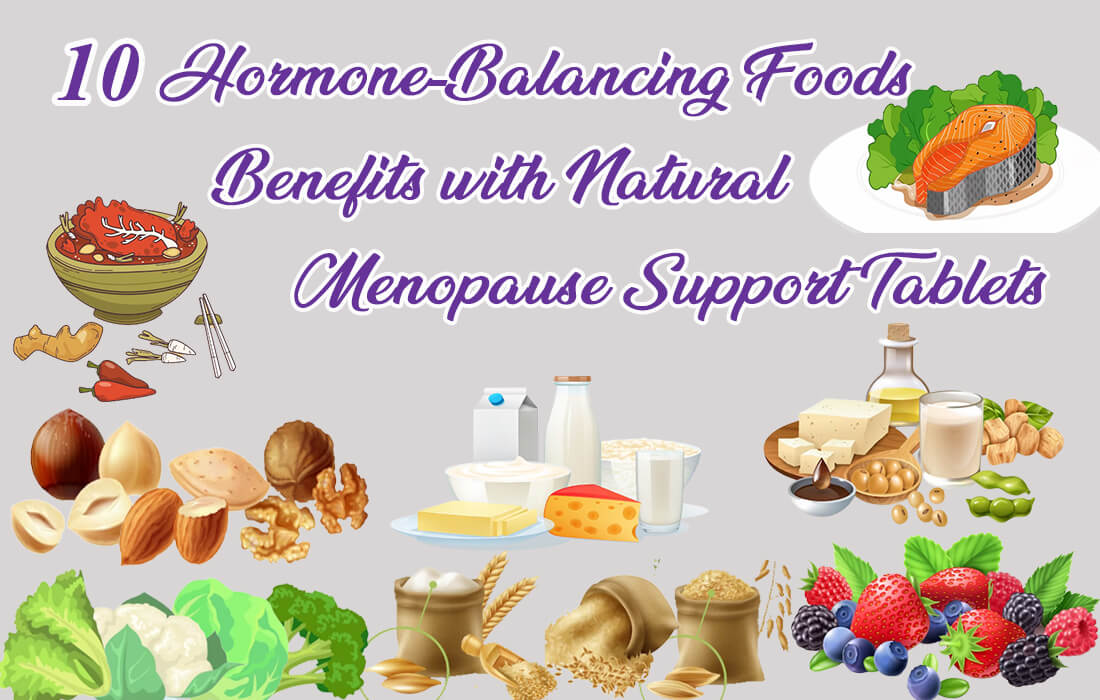
As women, we all know that menopause is an inevitable part of our lives. Although it is a natural process, it can bring about several unpleasant symptoms that greatly impact our overall quality of life. While there is no way to avoid menopause, there are ways to deal with menopause naturally, and one effective way is to incorporate hormone-balancing foods into your diet along with the menopause support tablets. These foods can help regulate estrogen levels in the body, which can help slow the onset of menopause. We will discuss ten hormone-balancing foods that can help women to deal with menopause naturally. So, if you’re looking for a way to support your body during this transition, read on to learn more!
Introduction to Hormone-Balancing Foods
As women enter the menopausal phase, they often experience various symptoms, including hot flashes, mood swings, and weight gain. However, eating a diet rich in hormone-balancing foods can be crucial in managing these symptoms. To improve your diet, making these foods a part of your daily routine is important. It can assist in maintaining balanced hormones, fostering the health of your cells, and acquiring the essential nutrients that might help ease menopause symptoms.
Foods such as broccoli, whole grains, soy products, and flaxseeds are all excellent examples of hormone-balancing foods. But it’s not just about what you eat; supplements such as menopause support tablets can also be beneficial in managing menopause symptoms. These tablets contain a blend of natural ingredients that help to support hormonal balance and overall well-being during this time of change. Overall, a diet rich in hormone-balancing foods combined with natural supplements can lead to a better quality of life for women going through menopause.
Foods for Balancing Hormones during Menopause
During menopause, hormonal changes can lead to various symptoms and imbalances. However, a healthy diet can significantly support hormone balance and manage menopausal symptoms. Here are the key foods that can help balance hormones during menopause:
1) Phytoestrogen-rich foods:
- Phytoestrogens are plant-based compounds with a structure similar to estrogen. During menopause, when estrogen levels in women decrease, consuming foods that contain phytoestrogens can help alleviate symptoms like hot flashes, night sweats, weight gain, and mood swings.
- Foods like tofu, tempeh, and edamame made from soybeans have a high content of phytoestrogens.
2) Calcium-rich foods:
- During menopause, decreased estrogen levels can make women more prone to bone loss and developing osteoporosis. Consuming adequate calcium is essential for maintaining bone health.
- Dairy products like low-fat milk, yoghurt, and cheese are calcium-rich. However, fortified plant-based milk like almond or soy can be good alternatives for plant-based options.
- Leafy greens like kale, collard greens, and broccoli also provide calcium.
3) Vitamin D:
- The health of our bones relies on maintaining the correct ratio of calcium and vitamin D. One way to get vitamin D is through sunlight exposure, a natural source of this vital nutrient. Spending time outdoors can help ensure you get enough vitamin D. However, during certain times of the year or in regions with limited sunlight, getting enough vitamin D from food becomes important.
4) Omega-3 fatty acids:
- The anti-inflammatory properties of Omega-3 fatty acids make them advantageous for handling menopause-related symptoms such as mood swings and joint pain
- Salmon, which is a fatty fish, is abundant in omega-3s.
- Plant-based sources like flaxseed and chia seeds are good options for vegetarians and vegans.
5) Antioxidant-rich foods:
- During menopause, it’s important to maintain a good antioxidant status to combat oxidative stress. That is because antioxidants neutralize free radicals in the body that can cause cellular harm.
- Berries such as blueberries, strawberries, and raspberries, citrus fruits like oranges and grapefruits, and vegetables such as leafy greens, bell peppers and tomatoes are all great antioxidants.
6) Foods rich in vitamin E:
- Vitamin E is believed to help manage hot flashes, a common symptom during menopause.
- Nuts like almonds, walnuts, and hazelnuts are rich sources of vitamin E.
7) Whole grains:
- Whole grains are better than refined grains because they contain more nutrients and fibre. They can help stabilize blood sugar levels, important for managing weight and mood during menopause.
- Good options include brown rice, quinoa, oats, and whole wheat products.
8) Probiotic-rich foods:
- As women go through menopause, their gut health may be impacted. It’s crucial to prioritize maintaining a healthy gut microbiome for optimal well-being.
- Probiotic-rich foods like yoghurt and fermented foods (kimchi) can support gut health and help digestion and nutrient absorption.
9) Cruciferous vegetables:
- These vegetables contain glucosinolates, including broccoli, cauliflower, cabbage, and Brussels sprouts. When broken down in the body, glucosinolates form substances that support liver function and promote hormone metabolism, potentially helping to balance hormone levels.
10) Water:
- Maintaining hydration is crucial for maintaining good health. During menopause, drinking enough water can help with symptoms like dry skin and hot flashes.
Also, combined with a balanced diet and regular exercise routine, women can find the best tablets to take for menopause that can be valuable in managing menopausal symptoms and promoting overall health during this stage of life. It should provide key nutrients that may be lacking in a woman’s diet during this time of transition, including calcium and vitamin D. By prioritizing nutritious foods, staying hydrated, and exploring targeted supplement options, menopausal women can empower themselves to navigate this significant life change with confidence and vitality.
Benefits of a Menopause Diet
A menopausal diet is a way of eating that focuses on nourishing the body during the menopausal transition. This type of diet can offer several benefits for women experiencing menopause. Here are some key advantages of following a menopause diet:
- Hormonal Balance: It can help promote hormonal balance by incorporating foods that support hormone production and regulation. It includes foods rich in phytoestrogens like soy, flaxseeds, and legumes, which can help alleviate menopausal symptoms.
- Symptom Management: Choosing the right foods can be key to effectively managing symptoms, such as hot flashes, night sweats, mood swings, and sleep irregularities. A menopause diet focuses on foods that minimize inflammation, stabilize blood sugar levels, and support overall well-being, helping to reduce these symptoms.
- Bone Health: Reduced levels of estrogen can heighten the likelihood of osteoporosis. A balanced diet emphasizes calcium-rich foods like dairy products, leafy greens, fortified foods, and vitamin D sources to support bone health and reduce the risk of fractures.
- Weight Management: Hormonal changes during menopause can contribute to weight gain, especially around the abdomen. A menopause diet emphasizes whole, nutrient-dense foods while limiting processed and sugary foods. This approach can support healthy weight management and reduce the risk of obesity-related health issues.
- Heart Health: After menopause, the risk of heart disease increases. A diet for women going through menopause includes heart-healthy foods such as fatty fish, nuts, seeds, whole grains, fruits, and vegetables. These foods can help maintain healthy cholesterol levels, reduce inflammation, and support cardiovascular health.
- Gut Health: A menopausal diet encourages the consumption of fibre-rich foods like fruits, vegetables, whole grains, and legumes. This dietary fibre supports gut health, promotes regular bowel movements, and aids digestion.
Conclusion
Menopause is a natural process that every woman will go through at some point. However, the unpleasant symptoms that come with it can significantly affect our quality of life. Incorporating hormone-balancing foods and herbal tablets for menopause into our diet is one effective way to deal with the onset of menopause naturally. By regulating estrogen levels, these foods can help support our bodies during this transition. So why not add some of these hormone-balancing foods to your diet and see how they can benefit you during this time? Remember, caring for our bodies is a lifelong journey; every little bit helps!

